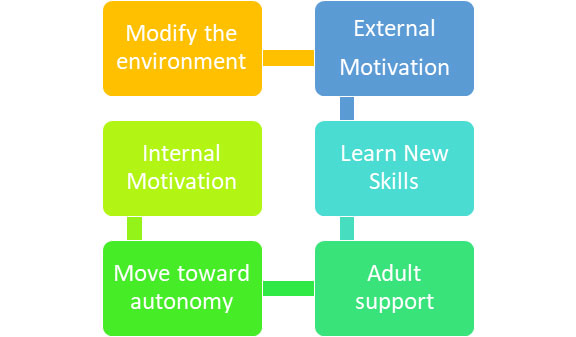

This week, I presented at the national Milestones Autism Conference on strengthening executive functioning skills in children with autism. I was supposed to be in Ohio to present live, but COVID-19 turned it into a virtual conference. Instead, I watched my pre-recorded hour as it was being broadcast, and I was available to answer questions through the chat.
I wrote the presentation mainly for other occupational therapists, but I was informed that many parents would likely attend as well. As questions started to come at me rapid-fire, I realized that most of the audience (at least those watching on a Tuesday morning) were parents who were searching for answers for how to help their child’s executive functioning skills.
It made me really realize that so many parents know that there is a problem, but they don’t really know what to do.
How frustrating!
Simplified, Executive Functioning (EF) skills are brain-based skills that support goal directed behavior. They are not fully developed until the frontal lobe of the brain is completely mature, around age 25. EF skills include: planning, organization, task initiation and follow through, and problem solving. Also, sustained attention, inhibition, emotional control and flexibility. Working memory, time management, and the ability to assess one’s own progress are also EF skills. Even adults are stronger in some areas and weaker in others. By the time we are adults and our brains are fully mature, most of us are aware of our weak areas, and have developed compensatory measures to work around them.
Deficits to the executive functioning skills may show up as problems following directions or remembering a sequence of activities. Children may have difficulty learning from past mistakes, staying focused for duration of a task, or maintaining emotional control in stressful situation. They may struggle with organization of personal items or to-do lists, with being flexible with unexpected changes, and with understanding how to adjust their behavior in various situations. These difficulties, in turn, manifest into problems at home, school, work, and with social skills.
At a certain point, most parents will notice that their child is lagging in some skills. He or she may also excel in some! There is no correlation of executive functioning with IQ, and the skills develop at different rates for every individual.
Have you found yourself using any of these common refrains?
Ask yourself this: if you have bargained, threatened, punished or rewarded your way to your child doing what you thought they should be capable of, did that success stick around?
Likely not.
The executive functioning skills need to be learned, repeated, and supported, over and over again until they are integrated.
Does it really matter if your child has a diagnosis of ADHD, Autism Spectrum Disorder or something else? Not really – because the process to strengthen them is the same. Kids with ADHD will have executive functioning deficits, as that is part of the overall presentation. Many kids with ASD also exhibit executive functioning weaknesses. Some kids – and adults – with no “diagnosis” struggle in one or more areas. Again, the process doesn’t change!
An occupational therapist knowledgeable in helping children and teens with executive functioning skills is invaluable. More than medications, more than talking about how the problems impact their lives, more than having changes made to the learning environment or curriculum – strengthening the actual skills and having the opportunity for real-life practice are the keys to long-lasting change.
I have developed a solution to do just this. I call it The Big 6.
The Big 6 flows in a process that moves your child through obstacles in any area of his or her life. We first make those obstacles a bit less daunting by removing or decreasing major barriers. He still needs to navigate and move through, not around, the obstacles, but if we start with something so big and impossible-seeming, he may never even want to begin. After some initial success is achieved, we continue to motivate while teaching new skills. The skills learned, combined with parent and other adult support, foster a larger sense of success. As your child becomes more successful, you can back off on your “hand-holding” support and allow more autonomy. Finally, when he or she has mastered the skill, they feel great about it and become motivated to continue to do so!
The process looks like this:

You may be asking, “how is it empowering to give my child so much help? I just want him to do it on his own!”
Think of it like this. Some people are born with natural talents in music, sports or creating art, while others need to learn and practice these skills many times before they achieve mastery. Everyone is capable, but it will take the second group longer. They will need more instruction, more time to practice, patient teachers, and supportive adults. Executive functioning skills will naturally mature with time, but if a child never truly learns to address his or her weaknesses, they may continue to be a problem into adulthood.
Occupational therapists are knowledgeable about physical and neurological development and take a holistic, whole-person view of all situations. Children are not defined by a diagnosis or deficit. I function as a coach when working directly with children and families on executive functioning skills. I have parents (and children, if middle school aged and older) fill out a questionnaire to assess executive functioning strengths and weaknesses. We talk about learning challenges, sensory processing, motivation, goals and interests, real and perceived obstacles large and small, and what has worked or has not worked in the past. We set new goals and develop systems together for strengthening the weak executive functioning skills.
The coaching model allows the child and family to be an equal partner in the process of change. This alone fosters “buy-in” with children and teens, who often feel at the mercy of others telling them what to do all day long!
Summed up perfectly:
“A good coach can help boost your teen’s skills and confidence, in great part because this individual has just enough distance from your teen to avoid threatening the teen’s pride or making the teen feel ‘babied’ as she might when a parent tries to play this role during adolescence.” – Guare R., Dawson & Guare C., Smart but Scattered Teens.
If you are frustrated with your current situation and want to help your child achieve what you know he or she is capable of, perhaps it is time to work with a coach. Contact us by filling out our ADHD questionnaire.